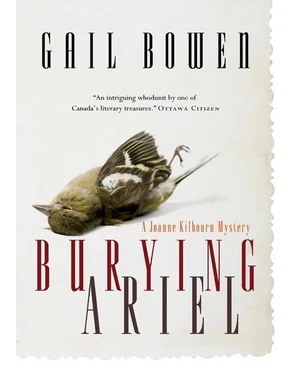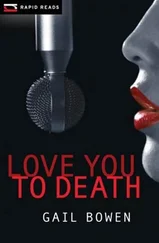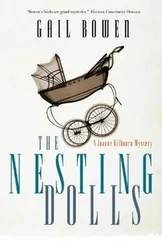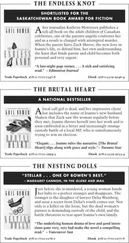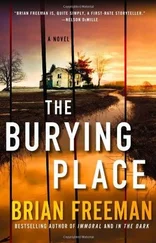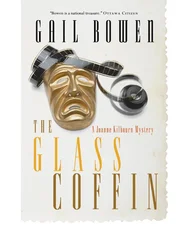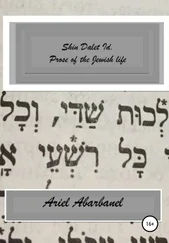Gail Bowen - Burying Ariel
Здесь есть возможность читать онлайн «Gail Bowen - Burying Ariel» весь текст электронной книги совершенно бесплатно (целиком полную версию без сокращений). В некоторых случаях можно слушать аудио, скачать через торрент в формате fb2 и присутствует краткое содержание. Жанр: Классический детектив, на английском языке. Описание произведения, (предисловие) а так же отзывы посетителей доступны на портале библиотеки ЛибКат.
- Название:Burying Ariel
- Автор:
- Жанр:
- Год:неизвестен
- ISBN:нет данных
- Рейтинг книги:3 / 5. Голосов: 1
-
Избранное:Добавить в избранное
- Отзывы:
-
Ваша оценка:
- 60
- 1
- 2
- 3
- 4
- 5
Burying Ariel: краткое содержание, описание и аннотация
Предлагаем к чтению аннотацию, описание, краткое содержание или предисловие (зависит от того, что написал сам автор книги «Burying Ariel»). Если вы не нашли необходимую информацию о книге — напишите в комментариях, мы постараемся отыскать её.
Burying Ariel — читать онлайн бесплатно полную книгу (весь текст) целиком
Ниже представлен текст книги, разбитый по страницам. Система сохранения места последней прочитанной страницы, позволяет с удобством читать онлайн бесплатно книгу «Burying Ariel», без необходимости каждый раз заново искать на чём Вы остановились. Поставьте закладку, и сможете в любой момент перейти на страницу, на которой закончили чтение.
Интервал:
Закладка:
My son’s room was private territory, and I didn’t enter it without cause. That afternoon, I had cause. I needed to tap into my office mail, and Angus’s computer was the only one in the house with a modem. After I turned on his computer, I glanced up at the bulletin board above his desk. He called it his Zonkboard, and from the time he was ten, it had been a montage bristling with evidence of his deep but shifting passions: skateboarding, the Blue Jays, endangered species, water polo, the Referendum, hiking, Buddy Rich, the women of Lilith Fair. That afternoon, wallet-sized photos of members of the graduating class of Sheldon Williams C.I. were thumbtacked between articles about the perfidy of the New Right and the excellence of John Ralston Saul and Drew Barrymore. The Zonk Factoid of the Day was a newspaper clipping: “The Inuit of Greenland believe that a person possesses six or seven souls that take the form of tiny people scattered throughout the body.” It was, I thought as I turned back to the computer, an oddly comforting possibility.
I typed a message announcing that on the following Tuesday I would begin teaching Ariel Warren’s Political Science 101 and asking anyone who had a copy of the text Political Perspectives to lend it to me until the end of classes. It was only after I hit send that I realized I’d cast my net too wide. Instead of limiting my request to our department, I’d entered the universal address for faculty and staff at the entire university. I discarded the idea of a follow-up message. In spring and summer, there were so many people who never opened e-mail that I would have been clogging the system.
I was rereading my original note when Angus came in. He leaned over and peered at the screen. “I thought you had the summer off.”
“So did I,” I said.
He gave me an awkward pat. “Well, you still have the long weekend, so let’s rock. Taylor’s downstairs saying goodbye to her cats. If we don’t make our move soon, she’s going to fall apart.”
I sighed with exasperation. “I’ve been through this with her a dozen times,” I said. “Sylvie O’Keefe is going to feed Benny and Bruce, and Jess is going to come over to play with them. It’s only three days, Angus.”
He shrugged. “Tell that to T.”
It was raining hard by the time we turned off onto the road to Katepwa. On the highway, we had listened to the drive-home show’s homage to the pleasures of barbecue and summer love. A fiery romance wasn’t on my weekend agenda, but the talk of sizzling meat was a reminder that within the next couple of hours I was going to be surrounded by a cottage full of hungry people. The dining room at the Katepwa Hotel served fine food at moderate prices, and it shared a kitchen with the Katepwa Pub, which served equally fine food that was cheap and available for take-out. As I slowed in front of the hotel, the boys and Taylor strained for a look at the lake. The rain was so heavy we could barely make out the beach, and as soon as I opened the car door I could hear the pounding of whitecaps against the shore.
Jackets pulled over our heads, we raced to the pub. Judging from the crowd inside, it was apparent that others caught in the downpour had felt the pull of a clean well-lighted place. The Katepwa Pub was jumping. Taylor drifted towards a group crowded around a big-screen TV that was showing a Jodie Foster movie; the boys headed for the shuffleboard table. The centre of gravity was shifting.
“Everybody back here with me,” I said. “You’re all underage, and we’re here to get food.”
Angus perked up. “What are we getting?”
“The special,” I said. “I don’t want to hang around while they cook dinner for seven people from scratch.”
“I wonder what the special is?” Angus asked.
“Chili,” Eli said. “It’s written on the chalkboard over there.”
“But we had chili dogs after ball last night,” Angus groaned.
“Sometimes the universe unfolds as it should,” I said.
Angus frowned. “What’s that supposed to mean?”
I gave him a short jab in the shoulder. “It means there was a cosmic decision that, despite your best efforts, our family was destined to eat chili tonight.”
The road to Ed and Barry’s was winding and muddy. Twice, we were within a hair’s breadth of sliding off the road, and twice, Eli, who had been entrusted with holding the hot food, manfully swallowed his yelp of pain when he got splashed. By the time we got to the cottage, the rain had stopped, but I was still edgy. Two of my children still had to drive that road, and one of them was with her husband and my only grandchild.
Ed and Barry had waterfront property. The cottage was new, built five years earlier, but they had designed it to be timeless, and it had a rambling, wicker-and-wisteria grace, a closed-in porch overlooking the lake, two full bathrooms, and a Jacuzzi. In short, it was perfect, or it would be once everybody had arrived safely. As soon as we parked, Taylor and the boys flew out of the car. Willie was right behind them.
“Can we just look at the lake?” Angus said.
“After you’ve carried everything in from the car, you can look at the lake all weekend,” I said.
There were only two bags I insisted on handling myself; both were paper, and both bore the logo of the Saskatchewan Liquor Board. By the time I walked through the front door with them, the car was cleaned out, and the boys and Taylor and Willie were racing past me on their way to the beach.
When I touched a match to the already-laid fire in the fieldstone fireplace in the living room, it roared to satisfying life. I carried on to the kitchen, placed my paper bags carefully on the table, found the kind of Dutch oven I dreamed of owning before I died, dumped the chili in, and turned on the burner. Dinner was under way. Some nights, I just had all the moves. As a reward, I poured myself two fingers of Glenfiddich and wandered out to the porch, so I could have a good view of Willie and the kids chasing each other along the shoreline. When Willie loped onto the dock, I knew there was nothing between his ears that would allow him to make the correction necessary to avoid disaster. His cannon-ball into the lake when he came to the end of the dock seemed as inexorable as a law of physics. So was the fact that as he splashed to shore, Taylor, Angus, and Eli waded out to greet him. It was a grey day, but I could see their laughter, and warmed by the whisky, my nerves began to unknot. Fifteen minutes later, Peter’s ancient Jeep rolled in, followed closely by the sensible Volvo station wagon that had replaced Mieka and Greg’s bright yellow Volkswagen Bug the week after Madeleine was born. Suddenly, the odds that I would make it through the weekend had turned in my favour.
The first moments of the reunion of my two oldest children were shot through with the currents of love and competitiveness that had always flowed between them. They were eighteen months apart, and their feelings for each other still had the primal intensity of the nursery. It didn’t surprise me that, after the initial round of hugs and greetings, they ended up together, arms draped loosely around one another’s waists, connected again. Physically, they were very different. Peter was tall, reed thin, pale, and serious, the inheritor of my late husband’s black Irish genes; Mieka was dark blond, hazel-eyed, with skin that tanned easily and pleasing curves that would become roundness after forty, and Rubenesque after fifty. Seeing them side by side again, I felt the familiar rush of pleasure.
My son-in-law looked at them with amusement. “The road company Donny and Marie.” He leaned down and brushed my cheek with a kiss. “Good to see you, Jo.”
“Good to see you, too.” I said. I took my granddaughter from his arms. “And it’s wonderful to see you.” As she gazed at me, Madeleine dimpled with the look her mother described as “crazed with delight.”
Читать дальшеИнтервал:
Закладка:
Похожие книги на «Burying Ariel»
Представляем Вашему вниманию похожие книги на «Burying Ariel» списком для выбора. Мы отобрали схожую по названию и смыслу литературу в надежде предоставить читателям больше вариантов отыскать новые, интересные, ещё непрочитанные произведения.
Обсуждение, отзывы о книге «Burying Ariel» и просто собственные мнения читателей. Оставьте ваши комментарии, напишите, что Вы думаете о произведении, его смысле или главных героях. Укажите что конкретно понравилось, а что нет, и почему Вы так считаете.
